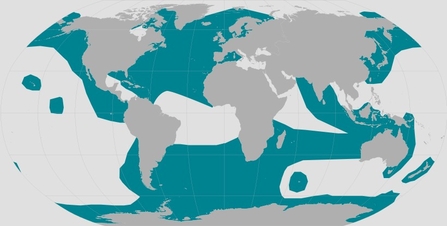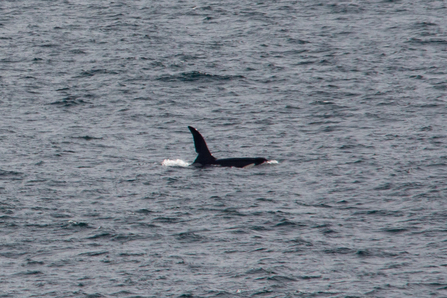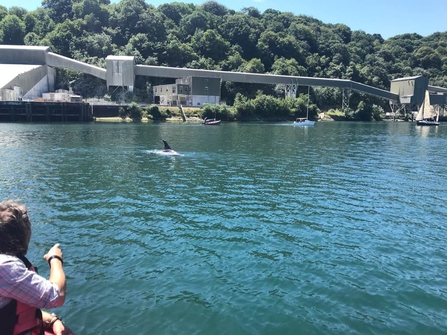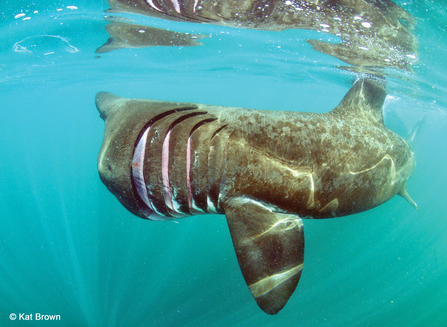Orca are the largest of the dolphin family, reaching up to 10m in length and easily recognisable by their black and white patterning which, although very distinctive, can vary among individuals and populations. The males have an impressive 1.5m tall dorsal fin which is often used to identify the species. Orca can live for up to 90 years and inhabit every ocean in the world; they are most abundant in the cool polar regions and are also found in the tropics.

Orca global range. Map by NOAA Fisheries.
Orca populations around the world are one of two types: resident or transient. The resident populations feed on fish whilst the transient populations are more aggressive and often hunt larger prey such as cetaceans and seals. In the UK, there is a small group of orca called the West Coast Community and this group shows characteristics similar to a resident population. This community can be distinguished from other visiting orca by the unusual sloping saddle patch and larger size. By identifying individuals by notches to their dorsal fin and differences to the shape or colour of their saddle patch, scientists have discovered this group consists of 10 members. Unfortunately, only eight of the pod are still alive: four males and four females.
The most distinctive animal in the West Coast Community is John Coe. This male orca has been seen regularly around the UK since 1992 and has a very large notch missing on its dorsal fin, making him very recognisable. There is a photo catalogue of the West Coast Community and all verified sightings are updated so they can be studied and protected. These orca are most often recorded in the Hebrides in Scotland but are sometimes seen in Ireland and Wales. There have been a few orca sightings recorded in Cornwall over the years, but until this month the sightings have not been verified by a conclusive photograph.

Orca named 'John Coe' - recognisable by the large notch on his dorsal fin, Image by Will McEnery
At 16:30 on 5th May 2021, Cornwall Wildlife Trust was made aware of a potential orca sighting just off the Minack Theatre in West Cornwall. The excitement circulated around social media with caution – will they turn out to be a Risso’s dolphin like so many of the sightings in the past years? But by the next morning it had been confirmed, two orca had been photographed in Cornwall! And it does not stop at that, not only had they been photographed, but the photos were also good enough to identify the two orcas as John Coe and Aquarius from the West Coast Community! This may possibly be the first record of the UK’s resident population seen in England and it’s the first confirmed orca sighting on Cornwall Wildlife Trust’s databases for decades. Orca can travel vast distances in a short time, so they were not expected to be hanging around in Cornwall for long. As expected, on 14th May John Coe and Aquarius were spotted near the Isle of Skye, 895km from Cornwall which means they travelled about 100km per day. Impressive!
Nature lovers in Cornwall were amazed by the latest sighting; there have been numerous reports of orca in Cornwall over the past decade, but never anything conclusive. In 2018, photographs taken in Fowey showed an animal with a large black fin resembling an orca. There was a lot of excitement going around South East Cornwall and lots of sea watchers flocked to the coasts. More reports of this ‘orca’ popped up around the coastline including in Cawsands and Plymouth Hoe but no one managed to get a distinctive photograph to verify it was indeed an orca. Then a few days later a kayaker published some footage of a very large, black Risso’s dolphin swimming in the Plymouth sound which shows us this orca sighting was unfortunately likely to be a Risso’s dolphin. This type of occurrence is quite common in Cornwall.

Reported orca in Fowey in 2018 which was later identified as a Risso's Dolphin
There have been 125 orca sightings reported to the Environmental Records Centre for Cornwall and the Isles of Scilly (ERRICS) since 1990 but none had been backed up with a conclusive photograph until the sighting in May. There is an interesting theory among some marine scientists that orca sightings in Cornwall correlate with basking shark distribution. Cornwall is lucky that ERRICS stores and analyses biological records for the area. According to these records, orca have been reported in Cornwall almost every year since 1990 and amazingly 1998 had 42 sightings! Most of these sightings (30) were in May and June and interestingly, lots of these sightings also recorded a basking shark in the area.
In 1998 shark scientist Colin Speedie studied a unique mass gathering of basking sharks near the Lizard peninsula and noted that there appeared to be a pod of three orca following the sharks over several days. There are also historical records of orca attacking and killing a basking shark in Porthcurno.

Basking shark sightings could be linked to orca. Image by Kat Brown/2020VISION
Different orca populations around the world forage and hunt a variety of prey from small fish to large marine mammals and sharks. The orcas of the West Coast Community have mostly been reported to be of the fish-eating type, but other orca visitors to the UK have been reported to hunt larger prey such as seals.
Unfortunately, the UK’s West Coast Community of orca are really struggling to survive. No calves have been sighted since records began in 1992 and consequently the population is recognised as endangered. Tragically in 2016 Lulu, the ninth member of the pod, died after being entangled in Tiree in the Hebrides. A post-mortem investigation carried out by Scottish Marine Stranding Scheme showed that she had extremely high levels of PCB contamination, over 100 times the accepted level in a marine mammal! Levels this high can have huge impacts on orca health and fertility. Sadly, the investigation also identified that Lulu had never been pregnant. These findings show what poor health this community is in and unfortunately this has led scientists to believe the population will soon be extinct.
Having the UK’s resident orcas visit our seas demonstrates how important Cornwall’s marine health is to these large dolphins, as well as to other dolphin species and marine mammals. Unfortunately, these majestic animals need our help and unless we protect them, they could vanish from our waters. The faster we raise vital funds, the faster we can act to stop their suffering and protect their presence in our waters by carrying out a comprehensive package of activities to reduce marine disturbance, mitigate against noise pollution, and increase sustainable fishing practices.
Cornwall Wildlife Trust’s Seaquest Southwest team will be joined by the Hebridean Whale and Dolphin Trust (HWDT) and Steve Truluck (an enthusiastic whale watcher and co-writer of the Scottish Killer Whale Photo ID Catalogue) on Thursday 17th July at 7pm for an online talk all about orca! Find out more about Cornwall’s unusual orca sightings and HWDT’s research into the West Coast Community of orcas! All funds from the event will be split between the two organisations 50/50. Reserve your place before it’s too late!



